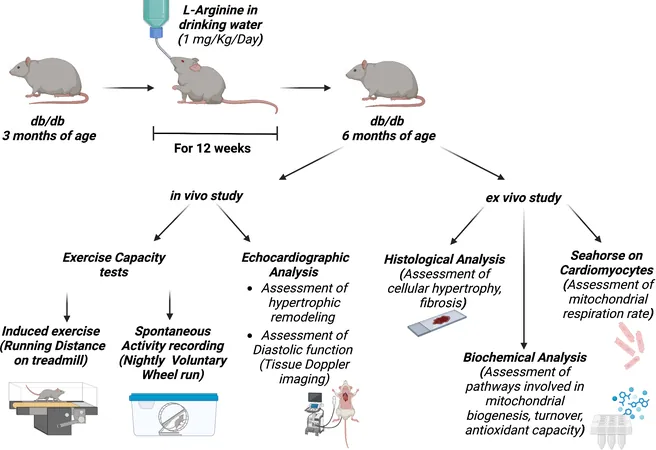
How L-Arginine Could Revolutionize Treatment for Diabetic Cardiomyopathy!
2024-12-20
Author: Daniel
Introduction to Diabetic Cardiomyopathy
Diabetic cardiomyopathy (DC) is emerging as a significant cardiac ailment characterized by dysfunction within the heart's metabolic processes. This condition leads to pathological left ventricular hypertrophy (LVH) that occurs independently of high blood pressure and coronary artery diseases. Alarmingly, DC stands as the leading culprit behind heart failure (HF) and increased mortality rates among diabetic patients.
Early Symptoms and Importance of Diagnosis
In its early stages, DC may present subtle symptoms such as diastolic dysfunction and exercise intolerance, which are often overlooked. These early signs, if neglected, can trigger the progression towards heart failure with preserved ejection fraction (HFpEF), ending in severe, potentially irreversible heart failure. Therefore, the prompt diagnosis and effective management of DC are crucial, as current therapeutic options are remarkably limited, leaving many diabetic patients vulnerable to heart failure.
Pathogenesis and Role of Mitochondrial Dysfunction
Recent studies indicate that mitochondrial dysfunction lies at the heart of DC's pathogenesis. Mitochondria, known as the powerhouses of the cell, become damaged and unable to perform optimally due to metabolic stress from factors such as glucose and fat toxicity. This damaged state not only impairs energy production but also contributes to oxidative stress, ultimately leading to cardiac remodeling and dysfunction. Emerging evidence suggests that certain microRNAs, like miR-143, may play a role in regulating these mitochondrial functions during metabolic stress.
Potential of L-Arginine Supplementation
Given this backdrop, effective prevention and treatment approaches must emphasize mitochondrial support and counteract metabolic stress in the diabetic heart. Research has indicated that L-Arginine (Arg) supplementation can enhance mitochondrial function and energy dynamics. Interestingly, Arg seems to offer benefits across various demographics—be it young athletes, elderly patients, or individuals with angina.
Research Findings on L-Arginine
Exciting findings from recent experiments conducted on db/db mice—a widely used model for studying Type 2 Diabetes—show that chronic administration of Arg may have protective effects against the onset and progression of DC. This supplementation has demonstrated the ability to mitigate LVH and improve diastolic function, which is crucial for maintaining a healthy heart rhythm. Moreover, Arg has been linked to improved exercise tolerance, an essential factor given that exercise intolerance significantly predicts cardiovascular and all-cause mortality in diabetes.
Mechanism of Action
The mechanism through which Arg exerts its benefits likely involves the activation of the PGC1 alpha signaling pathway, enhancing mitochondrial respiration while boosting the heart's energy production capabilities. Strikingly, Arg not only elevates energy levels in cardiac tissues but has shown to improve conditions in skeletal muscles as well, further supporting overall exercise capacity.
Need for Targeted Therapies
Although some treatments aim to control blood glucose and lipid levels, there's a glaring deficiency in targeted therapies for cardiac injury in diabetes. The complex nature of DC's pathology underlines the urgency for early diagnostic biomarkers and therapeutic strategies, with microRNAs being candidates for early detection of the disease.
Role of microRNAs in Diagnosis
Furthermore, our compelling research highlights the potential for using circulating levels of miR-143 as indicators of metabolic stress caused by DC. Not only does the upregulation of miR-143 correlate with detrimental mitochondrial health, but its reduction following Arg treatment suggests that L-Arginine could play a pivotal role in reversing signs of metabolic distress.
Conclusion and Future Directions
In summary, L-Arginine supplementation appears to be a promising avenue for enhancing mitochondrial function and combating diabetic cardiomyopathy. As we move forward, the implications of this research could spur innovative therapies to revolutionize how we treat heart disease in diabetic patients, ultimately leading to improved patient outcomes and quality of life.
Stay tuned for more groundbreaking revelations on how simple dietary supplements like L-Arginine could reshape the landscape of cardiac health in diabetes!




 Brasil (PT)
Brasil (PT)
 Canada (EN)
Canada (EN)
 Chile (ES)
Chile (ES)
 España (ES)
España (ES)
 France (FR)
France (FR)
 Hong Kong (EN)
Hong Kong (EN)
 Italia (IT)
Italia (IT)
 日本 (JA)
日本 (JA)
 Magyarország (HU)
Magyarország (HU)
 Norge (NO)
Norge (NO)
 Polska (PL)
Polska (PL)
 Schweiz (DE)
Schweiz (DE)
 Singapore (EN)
Singapore (EN)
 Sverige (SV)
Sverige (SV)
 Suomi (FI)
Suomi (FI)
 Türkiye (TR)
Türkiye (TR)